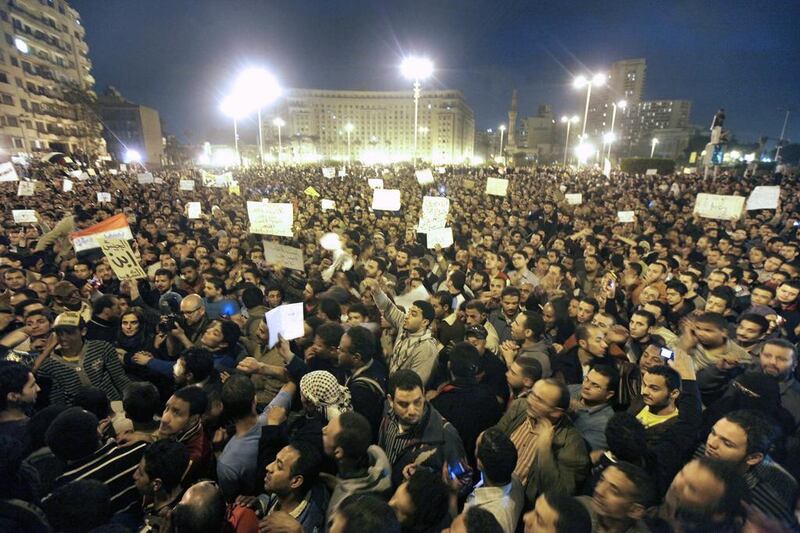Much ink has already been spilt, and rivers of it will follow this month, with the fifth anniversary of the Arab Spring already having begun. Some are calling it the “Arab Winter”, given the civil wars and the devastating displacement of people and loss of life that have ensued in countries such as Libya and Syria.
To the peoples of those states, Barack Obama’s words of May 2011 – that they were living through a time of “historic opportunity” – must seem mournfully bitter now.
One aspect that all would have to agree on, however, is that during its early phase there was a widespread supposition by outside commentators that there would be a flourishing of liberal parties, politics and values once the governments changed in the relevant countries.
Yet liberals and liberal parties fared extremely badly almost everywhere.
As Politico magazine noted: “In Egypt’s first parliamentary vote, seculars, liberals and leftists combined won 16 per cent of seats” – a derisory result, which some sought to explain away with the distinctly thin excuse that they weren’t organised enough.
They, too, seem to have shared the assumption that in a free contest of ideas, majorities would automatically eschew conservative politics in favour of ever-expanding liberties – and so did little to make this come about. “We were very good on destruction and very bad on construction,” said one activist quoted in Politico.
The reality was that throughout the region, the presence of substantial numbers of liberals and the support shown for liberal ideas was, for the most part, barely evident, both in elections and in new political realities.
Today, it is not only in the Middle East that liberalism is in trouble or under siege. The conservative American columnist Ross Douthat observed that in the dying days of 2014 something seems to have shifted. “For the first time in a generation, the theme of this year was the liberal order’s vulnerability, not its resilience.”
In Europe, they are threatened by the rise of new parties on the far left and the far right. In America, liberals may have a voice in the Democratic presidential candidate Bernie Sanders, but they are so powerless in Congress that even the incremental gun reforms Mr Obama is currently proposing have had Republicans queuing up to condemn him. If their situation is poor in the US, it is hopeless in Russia and China.
They appear to be in full scale retreat in India and Bangladesh, as they are in the many developing countries where no politician would describe him or herself as a “liberal” if they wanted to stand a chance of being elected.
I write this with no satisfaction. In the context of the UK, I have always been a liberal (for periods with a capital L, at others with lower case one) and continue to believe that some of the country’s greatest achievements and political shifts have been due to Liberals or Liberal-minded leaders.
But then liberalism has very strong roots in Britain. I feel confident in supporting it there as a creed that stems from British values. In much of the rest of the world, its roots are very shallow, have mainly grown from imported seeds, and fared best in the soil of elites who disdained what they regarded as the regressive views of unenlightened majorities.
The evidence for this – frequently provided electorally – has led the western liberal triumphalism of the post-Cold-War era to give way to hand-wringing when the liberal ideas that their most earnest proponents believe to be universal are inexplicably rejected. But as one columnist put it: “Russia is democratic. That’s why it’s conservative. Its people demand it.”
The fact is that traditional cultures that liberals accuse of being oppressive, and religion, have a much stronger hold on a large part of the world than a belief system that many feel actively tries to disrupt and impose alien values on their own ways of life.
The proponents of untrammelled liberty and progress push against gates run by those who prefer stability and cohesion, or who put community far above the individual and in many cases, those gates are not giving.
It is time for western liberals to be more respectful of this. The anniversary of the Arab Spring is an opportunity for them to reflect that they may be right to support calls for reform, but for reforms that are appropriate to the relevant cultures, and which work towards aims that we can all agree on, like good governance, inclusivity, sustainability and improved education. Reforms that aim to let loose what many view as a libertarian free-for-all are clearly what many populations simply do not want – and that’s their right.
Are western liberals still arrogant enough to think this should be imposed on the rest of the world? Somewhat surprisingly, one such columnist – the Financial Times’s Janan Ganesh acknowledged the true state of affairs just yesterday. “Those of us who really are mad about freedom,” he wrote, “are a minority, and not a substantial one.”
Even making that admission places Ganesh in a still smaller minority. Others must join him, if the lessons five years on across the Arab world are to be drawn correctly.
Sholto Byrnes is a senior fellow at the Institute of Strategic and International Studies, Malaysia





